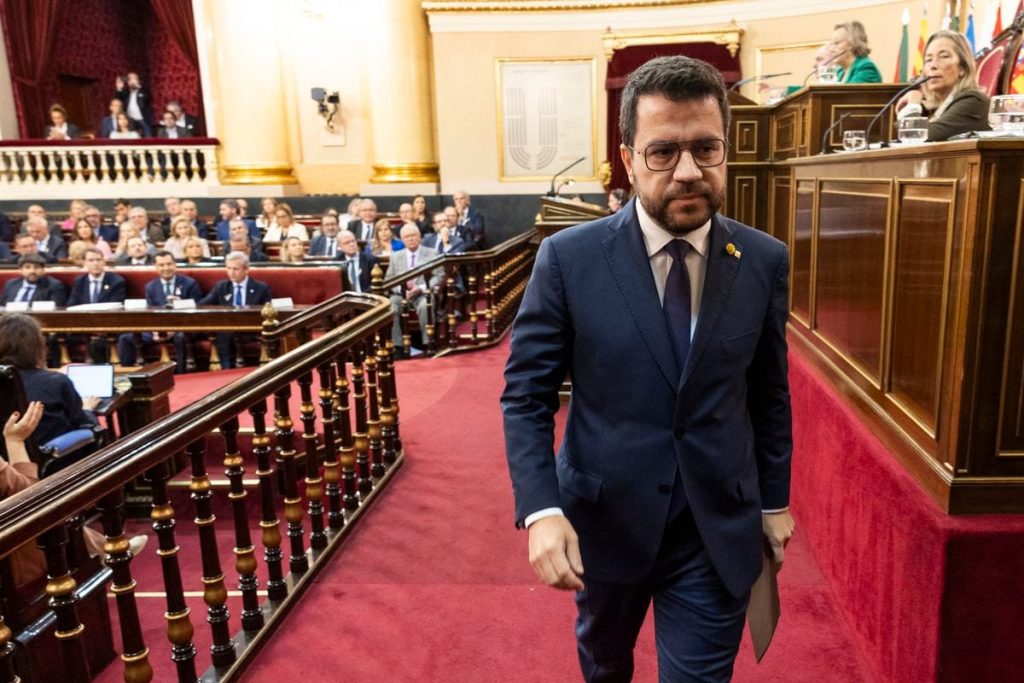The noise generated by the absolute majority of the PP in the Senate will make the Catalan campaign live intensely between its walls from this Monday until the elections on May 12. Several milestones marked on the parliamentary calendar have opened a scenario in which both Catalan independence forces and the rest of the parties will have the solemn platform of the upper house to confront their positions before the elections. The first event is the session of the General Commission of the Autonomous Communities on amnesty, which will be held this Monday, and in which Catalan President Pere Aragonès will face six regional presidents of the PP and senators from other groups. This day is added to the processing of the amnesty law, with the ‘procés’ and Catalonia at the center of the debate, and the plenary session to request a conflict of jurisdiction between the Congress and the Senate over the amnesty measure. Finally, there is the investigation committee on the Koldo case promoted by the Popular Party.
The General Commission of the Autonomous Communities will begin on Monday at 10:00 in the Senate. On this occasion, Aragonès will not be the first speaker to intervene at the podium, but he will be the first of the regional presidents to speak. Sources from his team see this session as a perfect showcase to display his most institutional profile and show himself as a separatist who advocates for dialogue, but also as the defender of the interests of all Catalans. Aragonès, according to sources close to him, will not only defend the amnesty, but will also take the opportunity to insist on demands such as unique funding, which has caused much debate among the regional presidents.
In the Catalan elections, the Popular Party led by Alejandro Fernández aims to concentrate the ‘constitutionalist’ vote against amnesty around its ballot, calling on voters from Ciudadanos, PSC, and Vox. The Senate microphone provides another platform from which to launch their attacks against amnesty. Six out of the 11 regional presidents of the PP will attend the debate on Monday, including the Madrid leader Isabel Díaz Ayuso and the Valencian Carlos Mazón. Various parties have registered dissenting votes against the text, so they will speak after Silván in an exchange of arguments between the forces in the Catalan elections.
The processing of the amnesty law by the PP in the Senate has been extended to two months, instead of the usual 20 days, due to changes in the Senate regulations. This means that all parties will have the opportunity to intervene in the sessions of the Committee and confront their model for Catalonia just days before the citizens decide their vote. The PP intends to request the appearance of legal experts to speak against the amnesty since April 16. The final rejection of the law in the Senate plenary is expected to take place just before the Catalan elections in a high-voltage session.
The plenary session requested by the Popular Party parliamentary group to raise a conflict of competences between the Senate and the Congress over the processing of the amnesty law will take place next Wednesday. It is expected that the initiative will be approved thanks to the absolute majority of the PP amid another confrontation over the amnesty measure and Catalonia as a backdrop. The popular party’s request will reach the lower house on April 11, so the Congress table will have until May 11 to respond, just a day before the Catalan elections. If they do not respond, it will be interpreted as a no.
Political parties have until Monday at 2:00 p.m. to register in the Senate the list of witnesses they intend to call in the investigation committee on the Koldo case promoted by the PP. The first appearances are expected to start at the end of the month, coinciding with the lead-up to the Catalan elections. The PP has not ruled out naming any Socialist Party leader for the committee, so Prime Minister Pedro Sánchez or former Health Minister and current PSC candidate Salvador Illa could be among those called to testify. This situation allows the PP to directly confront the PSC leader at a critical moment prior to the elections and has led to strategic considerations within ERC and Junts regarding their campaign strategies.


